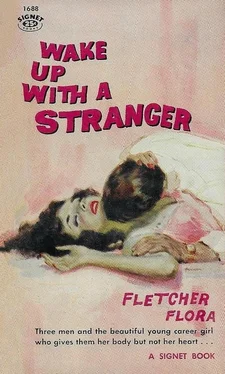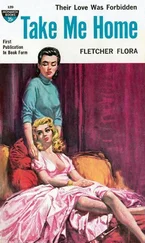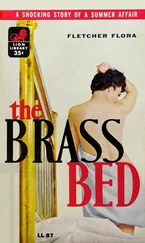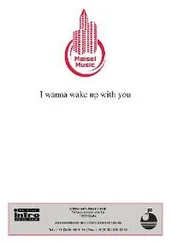“I suppose you will not be free later?”
“No.” She shook her head. “I think we had better make it another night.”
She actually regretted that it was impossible, or at least impolitic, to let him come to her apartment later. And she tried to make this regret plain in the inflection of her voice. But she could see immediately that he reacted in the way she did not wish, with a kind of morbid and unreasonable sensitivity, as if he had been repulsed in a totally improper advance.
“Well, it doesn’t matter, there’s no hurry about it,” he said. “Perhaps it would be better if I were just to give you a ring sometime.”
“Yes,” she said, “perhaps it would.”
He nodded and went away without saying goodby, and she began to wonder why she had responded so warmly to someone she had hardly missed, and would not have missed if he had never turned up again. Now that he had returned so abruptly after his long absence, however, she was honestly anxious to see him, to talk with him and to learn what he had been doing in the interim between going and coming. There seemed to be no good reason why she should be so involved and she couldn’t understand why. But it did not have to be understood, so far as that went, because it was something that could simply be accepted.
Just as all things, she thought, must be accepted in the end for what they are and without concern for how they became — the inexplicable allegiance, for instance, of a man like Earl Joslin, who was legally and morally uncommitted and who was now coming back to her among the tables.
She was alone in her apartment and in bed by eleven-thirty, and she thought that she would never go to sleep, though she kept her eyes resolutely closed and tried to make herself as passive as possible. After what must have been a much shorter time than it seemed, she did in fact go to sleep and was awakened at ten minutes after twelve by the sound of the telephone ringing. She assumed, at least, that she had been awakened by the telephone, but she wasn’t quite sure. She waited for a repetition of the sound which, when it came again, was the buzzer at the living room door.
She turned on the light and put on her glasses, thereby becoming somehow more capable of coping with such intrusions as bells and buzzers and midnight callers. After waiting for the sound to stop and start again, she got out of bed and slipped a robe on over her transparent blue nightgown and went to the door. The buzzer started for the third time, expressing a kind of angry desperation, clearly transmitting the temper of the caller. She asked herself who could possibly be at the door at such a time, and she answered that it had to be Enos Simon, a certainty she possessed without knowing why. She only knew that it was he, by a kind of sense or insight or premonition that was independent of logic or evidence. So she was not in the least surprised when she opened the door and saw him there in the hall.
He had been drinking, was really quite drunk, and this was a condition she had never seen him in before. He stood looking at her with eyes that expressed the same strange confusion of anger and desperation she had heard in the buzzer. This seemed to her wholly irrational, because she could see no reason why he should be either angry or desperate. His face, she saw now, was much thinner than it used to be, and it looked older and tireder than the intervening years should have made it. At first, right after opening the door, she was angry that he had presumed to come here after she had told him not to come, very late and clearly drunk in addition, but her anger, if it was actually strong enough to be called that, was quickly gone. She understood perfectly well that he had come now, neither earlier nor later, because he was somehow driven and could not help it. She felt strong by comparison but somehow vulnerable.
“You had better come in,” she said.
He walked past her into the room and sat down in almost the exact center of the sofa, folding carefully at knees and hips and sitting with a peculiar rigidity of his torso, not touching with his back the back of the sofa. She sat down beside him. Turning his head only slightly, he looked at her from the corners of his eyes with a curious mixture of uncertainty and slyness.
“Are you angry because I’ve come?” he said.
“No,” she said. “For a moment I was, but now I’m not.”
“Why? Why aren’t you angry?”
“I don’t know. I admit that I should be, but I’m not.”
“You shouldn’t have let me in, you know.”
“No doubt you’re right. At this hour, I probably should never have answered the door. Nevertheless, I have let you in, and here you are, and I should like to know why you have come.”
“That’s simple. Because I wanted to see you, and I didn’t want to wait any longer.”
“Well, I find that difficult to accept. You have been in town since January, you said, and you might have seen me long ago.”
“I told you that I was afraid you wouldn’t care to see me again. You remember that I don’t like to risk rejection. After I saw you tonight, though, it became different. It became intense and near again, as it was that last summer, and I had to come.”
He spoke slowly, with slightly exaggerated enunciation. He had been drinking heavily, that much was certain, but he did not speak as if he were drunk, or had even drunk excessively, except for the abnormal caution he was exercising.
“You have had too much to drink,” she said.
“Yes, I have. I admit that I have. Having too much is something I do too often, and I admit that also.”
“You didn’t used to drink at all, except a little beer.”
“True. It’s something I’ve learned since then.”
“Why do you do it?”
“Well, it comes in handy.”
“For what?”
“Oh, for all sorts of things. For forgetting things, and for making things seem different than they are, and for acquiring courage to do things I wouldn’t otherwise do.”
“Is that why you drank tonight? The last reason?”
“To get the courage to come here? Yes. Of course. There is certainly no point in denying it. I drank quite a lot in quite a short time, and here I am.”
“It was completely unnecessary. Now that you’re here, I’m very glad to see you.”
She said it, she thought, only to reassure him, but after the words were spoken she realized that they were true. She realized also that they should not, for her own good, have been true at all. In her life, he could be at best no more than a mistake, and this kind of mistake at this time was something she could not afford.
“Why are you glad?” he said.
“I don’t know. Perhaps I am also remembering how it was that summer.”
He turned to face her more directly. Without thinking, she reached out and took one of his hands. “Is that true?” he said.
“I think so. I’m not completely sure. I may know definitely after a while.”
“It was good, that summer. It was the best time of my life. Do you know that I was a little afraid of you?”
“Why ever should you have been?”
“Because you were so sure of yourself and I was not. You knew just what you wanted to do, and I hadn’t the least idea. Still haven’t, for that matter. Are you designing, as you planned?”
“Yes. I’m working in a shop here.”
“Are you successful?”
“Somewhat. I’m becoming so, I think.”
“You see? You are certain to succeed in anything you choose, and I am just as certain to fail.”
“There’s no good reason why you should fail. Why do you feel this way?”
“I’ve tried to understand it, and I believe it is because I do not choose at all. I’m always chosen. Do you see the difference between us? You choose, I am chosen.”
Читать дальше












